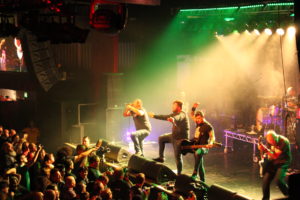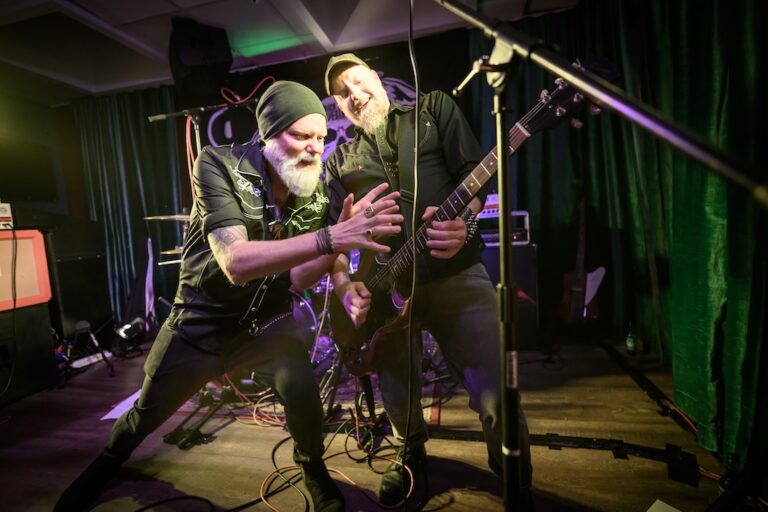In 1998 Raging Speedhorn appeared to a world entirely unprepared for their unique brand of music. Their stage shows were intense, uncompromising and entirely unpredictable and through tireless gigging around the country they built a fan base more than willing to wallow in the insanity with them. There was no artifice with Speedhorn, their brooding stage presence reflected a band unable to articulate their demons in any other way and an air of danger was ever present once the band took to the stage. However, by 2007 the band had started to unravel and, following on from the underrated before the sea was built, the band went on hiatus and it was assumed that the time of Speedhorn had passed.
Far from dead, it appears that the beast was only sleeping, and in 2014 the band reformed, playing knock-out sets at Sonisphere and Damnation before embarking on a UK tour. The dates were insane and it was clear that Speedhorn were newly revitalised after their time away. What followed were various live dates, including a mind-blowing run with Will Haven, and, eventually, a Pledge campaign to record the fantastic new album ‘Lost Ritual’. We caught up with Jim Palmer the band’s guitarist, at Hard Rock Hell’s inaugural Doom Vs Stoner event in order to discuss the nature of live shows, the importance of individuality in art and the benefits of recording an album freed form the shackles of a recording contract. Alongside Jim was also another Jim, the band’s long-suffering tour manager, whose long history with the band allows a great degree of insight on the nature of the band seen from an intimate, yet external, perspective. Jim’s interjections are in italics lest you think that Jim Palmer is schizophrenic and talking to himself…

So, when I saw Raging Speedhorn last time, you’d just reformed and, at that time I think you’d just launched the Pledge campaign, which is a massive change in the way that you approach recording from when you first started and had a label to deal with because it allows for more freedom. How was your experience of working to create an album that was funded by the fans and not by a label who have very specific expectations?
Well, the first thing is what you said, which is freedom. You very much feel that, because the fans are funding it, you feel more responsibility. At the end of the day, certainly from our point of view, the fans are the most important thing and they always are. But also the freedom comes from the point of view that there’s no one hitting you with “you should do this, you should do that; your image should be this, your image should be that”. Because we had just reformed and because we were kind of new in terms of members of the band and also Frank coming back, we needed that freedom to write pretty much how we were feeling then. So whatever we felt what the album was going to be is what it needed to be, whereas with labels, they tend to expect X or Y.
I think they put too much pressure on time scales as well
Well there’s that as well. I mean you’re expecting very much that, when the label’s paying for it, you’ve got a week to do this or you’ve got so many practices to do that, whereas we felt very much that we could book the studio only once we were happy with what we had. As it turned out, it still happened spontaneously anyway. I think that’s generally how this band writes and, to be honest, most bands that I’ve been in write that way. We had lots of practices where we tried to write, but things weren’t quite right. Riffs worked, but we never actually had songs, and then the weekend before we were supposed to record, we had two new songs and we had eight more to write. So we went into the studio knowing that we had eight songs to write and two days to do it and we just… literally eight songs appeared!
Even the lyrics weren’t done!
There were no lyrics, just music! There were eight jams that were brilliant and we liked them. So we pretty much just went to the studio without any… You can’t do that with a record company. They want the demo there and they want the songs so they can listen to them before you record. They want this amount of time to do this, that and the other, and it kind of forces the music to be something. So that’s pretty much the freedom that pledge gave us… and also that wonderful feeling that it gave us, and to be honest I think it did help us, because we were thinking “Shit! How’s this going to work?!” The fact that the fans were funding it, that’s really special man, that’s a fucking special thing, it really is.
What you have to realise is that, with Speedhorn, everything’s very spontaneous, like a fucking yo-yo! You never know what you’re going to get – you’ll go to see what they’re doing and sometimes they’ll be rolling around on the fucking floor. I’m not part of the band, but you can follow the comments about the campaign and when people give you money; when they personally give you that money… there was that whole video with Dave, wasn’t there? and people were like “I can’t believe you were spending money on booze and whatever.” And it was like “Oh right, I’ve never looked at it like that before!”
It’s a personal investment that people are willing to make. I was saying to Jim, our TM, earlier that, when we first did the reunion, the buzz was just the reunion. There was no new music, it was just a reunion. But once that buzz had gone, we really wanted to carry on, but we couldn’t because we couldn’t keep playing the same old songs. So then, for people to say that they wanted more music and to give us the money to make it was mind blowing.
And to me it is the future because wherever you can have a fan base and have them fund it and be happy to do that, and then give them product thanks to their funding… which I always saw as a pre-order. I mean people have all sorts of views on pledge, but it’s a pre order. You pay now, and then you get a product later. That’s the beauty of that. And you haven’t got some asshole with a contract ten miles long – some Willy Wonka contract that’s got writing this big at the bottom that you don’t fully understand, but you sign it and realise you’ve signed your life away.
It’s difficult isn’t it, because even with Pledge out there, the dream is to get onto a label, because if you’ve got that… if you’re a small band there’s a level of distribution which you don’t have – so it seems Pledge is really good for bands as long as they have the reach and the method itself isn’t abused, because I’ve seen all sorts of weird stuff get put out there!
Ah, but that’s not Pledge, that’s Crowdfunding, which I know is a similar thing, but Pledge is a company, Pledge is one thing. It’s really just for albums and things like that. There’s also the crowdfunding side which is crowdfunding to have a girlfriend or whatever, and that’s the bullshit side that causes people to doubt it. But, as I say, if you’ve already got a fan base and you want to do something and don’t want to be locked into a contract or whatever, Pledge is still a valid place to go. People see it as a valid place, right down to the point where, if you don’t get the product, because of the way you invested the money you can get the money back, so you’ve not lost anything, you’ll get the money back if it all goes tits up. It’s not giving money to Kevin who can’t get a girlfriend or whatever… all this bollocks you read about.

Since you got back together, you seem to be almost perpetually on the road- there was that first tour where I saw you in Birmingham in, I think the academy 3, and then there were some dates with Will Haven and a lot of festivals this year and yet there was this gap of seven years. Was it difficult to try to maintain the commitments that come with getting older alongside touring with the band or have you found ways to mitigate that?
To be honest we do what we can and what we’ve done so far is what we can. If anything, it feels a bit easier. For me personally it feels easier, because I’ve got my own business and I can work that around the band. Certainly, two other guys in the band – Frank and Gordon have their own businesses – they can work around it if they need to, they can get other people in to do the job that they do. The other guys never moved on from music anyway, they still lived the life that was easily stoppable to go on tour. It never gets easier, being away a lot, it never gets easier having to work your life around being away, but it’s worth it and, as I say, as you get older, you’re more able to cope with how you’re going to work this shit out. When you’re younger, you think, “oh great, a tour!” and then you go away and it’s like “Fuck! I’ve got no money!”
I think they enjoy it more now.
Yeah, yeah, and that’s the other thing, you enjoy it more because you’re more able to cope with what goes with it. For any band who first goes out on a tour, it is a totally new world and you can lose yourself in it whereas now we’re more mature, we’ve got a more mature outlook on things. We do party… we party every day, but we’re older, we’re wiser. We know what to do and what not to do when we can’t see straight! We know our limits. We know where we can go with things…
We know how to say ‘no’, that’s the difference…
Yeah.
I think you’re not self-conscious about what you have to do, you know when to say “no, that’s enough, this is just getting fucking stupid!” I’m not even a member of the band, but I’ve been around for a long time, and I think we all just talk a lot now, we chat a lot more and if you’re feeling a bit shit, just tell someone. I remember back in the day the band was a self-destruction machine and no one talked. But now people just chat and stuff.
Which is part of what I was saying, it’s that maturity aspect where, back in the day, it was kind of like go out and get blasted, not talk to each other and be very much separate entities, now, because we’re mature we listen and we talk and we interact with each other… we actually care and if one person’s struggling we’ll pull together to help them out, so I think, if anything it’s easier. But also, an important thing I’ll put in there is I don’t think we have toured that much because bands don’t tour that much anymore.
So it’s a contrast thing…
Yeah, it’s a contrast thing because, certainly the bands I was in 95-96, a UK tour was three weeks. Now a UK tour is a week or so and that’s a lot of dates! People say “UK Tour, a whole week? Bloody hell!” and really, we used to do three! We’d play every pub in the fucking land, to one man and his dog, you know. So, you’ve also got to look at that perspective thing.
One of the things you did, about eight months ago I think, which surprised the hell out of me at the time but also didn’t in hindsight, was the split EP with Monster Magnet via Desertfest. How did that come about?
Monster Magnet for me personally and for the other guys in the band, are a band we’ve always looked up to and when you actually really think about, they’re a party band and, yeah Monster Magnet went through a period of trying to sober up and you know… all the rest of it, but at the end of the day, when you think about classic Monster Magnet, it’s a party – good time rock ‘n’ roll party and with Speedhorn… people say we’re ‘metal’ or whatever, but good time, party rock ‘n’ roll band, really, at the end of the day.
How it came about – the guys who put Desertfest on, when they got in touch with us about it, they said that they were stoked that we were back together, they were lifelong fans and were really chuffed to see us. Every year they’d pick two bands to do a split and basically they picked us… a lot of bands who get picked for things like that these days are picked because of who they know or what money they invest or whatever… but Desertfest don’t. They’re one of the greatest movements, let alone festivals, that there is because of how it’s run. It’s run for the bands, for the fans… it’s very genuine and honest and they basically picked the band that they loved. And because we were doing it and they said they’d loved us forever and they picked us, they saw Monster Magnet, as I said, in that same vein and they asked the band and they were totally cool and that’s how it happened. For me – I was like woah! I’ve got the two different versions at home on my wall!
It made so much sense when I listened to it, but before it came out I really hadn’t noticed the musical parallels that existed between the two bands, but afterwards it really hit me how well it worked.
My thinking in life in general about music is that… I hate genres. I hate pigeonholing of anything. I think anything that involves pigeonholing art of any kind into “it’s got to be this” or “it’s got to be that”, you put it into little holes and label it – I hate that. The reason I hate it is because those parallels are divided more. But when you actually look at Monster Magnet and what they are, people tend to think of them as this stoner, psychedelic fucking rock ‘n’ roll type of thing and then you look at us and, well, Speedhorn have been pigeonholed as just about everything apart from psychedelic rock ‘n’ roll. But, when you actually look at the essence of classic Monster Magnet, it’s just good old fashioned, turn it up loud, rock ‘n roll. That’s all we are, really. So, tear up the pigeonholes and you can see why it worked.

…and yet one of the big challenges for younger bands is how to get away from that because so often, when band’s start out, they feel they have to conform to a given genre in order to build a fanbase and it can be very hard to move away from that need when it seems so prevalent.
Exactly, I agree, because that’s how life works. You go on iTunes, Spotify or whatever and you’ve got that genre list or whatever, but for me it’s not the genre that you’re looking for and then you find the bands that you want. For me it’s the shuffle button, you know? That’s music for me! We were saying, as well, that the best festivals, as well, are the festivals that have everything. You’ve got all sorts of fucking music, you’ve got a tent playing jazz and then a grindcore bit. You know what I mean, that’s what music is to me, but then music’s always been about art. It’s an art form, it’s another way of expressing yourself and anything goes for me… I mean apart from shitty pop music that’s forced down your throat, and even some of that from the eighties I love…
That’s going to be the headline of this interview…
I was a new romantic! I’m not joking, I had a white shirt with the proper lace cuffs and everything !
My first ever record was ‘seven and the ragged tiger’ so I’ve got no grounds to criticise!
Really?! So there you go!
But I know what you’re saying; it is hard for new bands. All I’d ever say to new bands, just be yourself, and if you be yourself enough, and keep at it enough you will make a dent. You will gain fans, you will gain an audience. Keep playing your local area.
The thing is if you conform you never stand out.
Right now there’s so many bands out there, there’s an over-amount of everything, so if you conform to any one thing to try to be like someone else, you will get lost, you’ll disappear, you’ll be nothing. If you be yourself, and keep being yourself and keep doing it; and this is why I argue in many ways that it’s no different to how it ever was; if you keep touring and touring and gigging and gigging and doing your thing shouting out loud to people, and keep doing it, you’ll get a following, even if each time you only have one person. And in all the towns, you only have one person and you keep going, eventually people will travel to see you and you’ll build a following and you’ll get somewhere because you stand out, and you’re different and people will have to pay attention to you. If you conform, you’ll just die on your ass. Unless you’ve got some big money mogul behind you who’ll pay people off to get you on everything.
It’s like a lot of bands just go on Facebook now and try to get a million likes
Screw all that bollocks as well!
You’ve got to work from the ground up and get those foundations
And the best way to do that is to just play, play, play. Get good at what you do, get good at what you do; be you and do what you do.
That’s what makes any band stand out for me and Slabdragger, who played earlier, were a great example of that – all I want from any band, it doesn’t have to be perfect, it has to be passionate and that’s what I love about Speedhorn – you bleed and scream and shout and spit and you have to duck if you’re in the fucking audience, but that’s what you want from a band…
It should be dangerous, because it means something. For me, I’ve always seen it as that way. I’m one of them people, and I think we’re all the same in this aspect; I’m not very good at getting shit out or talking about something. I’m not very good at dealing with shit, and that’s where I do it. There’s nothing better than going on stage with a whole heap of shit on your shoulders and you come off and it’s just gone. And on top of that, there’s a bunch of people who’ve screamed at you and loved it with you. And then you get the chance to go and meet them all and fucking have a drink and party… what the fuck is better than that? Really? Yes, you can be all pretence and that, but at the end of the day, you should go on stage and give it everything, like it’s your last ever gig.
With SPeedhorn, you never know what you’re going to get
People ask us if that shit’s rehearsed or whatever, but every gig you’ll see us, hopefully… well, you’ll get the same thing in terms of playing, but before and after and what we do when we go on… no one knows!
Like the last gig we played at the Underworld, Frank lost his shoes two minutes before he went on stage and a guy in a bike helmet…
Yeah, a guy crowd surfed on to the stage in a bike helmet! I shit it, I was like “I’m going to get killed! Why’s he got a bike helmet, surely it means he’s going to kill me?!”
Frank looked over and fell backwards… it’s that thing where you never know what’s gonna happen.
Coming back to what you were saying, at the end of the day, you can go through the motions as a musician because you want to do it as a career and get bored of it and therefore go through the motions but in our case we don’t. It means something and it means something that people turn up. It means something that we can play and it means something that we can do it. It means something that we can get shit out and it means something that we can play musically what we want to play. It means something that we can have a good time togerther. It’s like a way of getting rid of all the shit in life and making… sometimes life is shit, but when we get to do that, it couldn’t be any better. Sometimes life is great and you get to enjoy it – that’s how it is. That’s how it is for Boss Keloid. There are so many bands on the scene who give it everything. And it’s not because backstage they’re all running on the spot and doing press-ups, they go out there and give it everything because they love it that much and they give it everything. And it’s the same thing for the audience – you see blokes who’ve been stood all day with their arms folded suddenly jumping around and going mental and helping up… it’s the same thing. It’s just fun.



